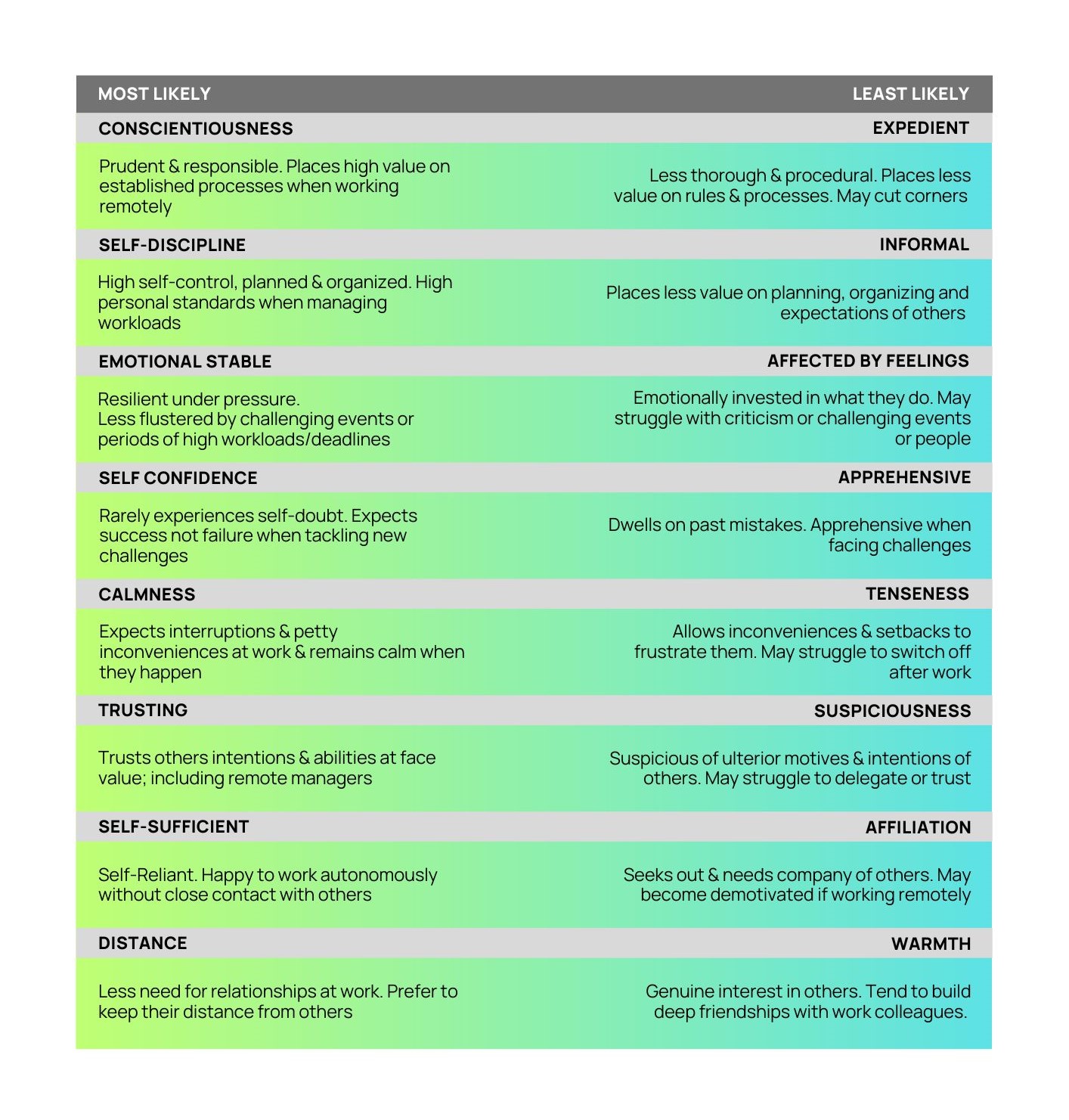Since the Covid pandemic changed our attitudes towards working from home and accelerated an already growing trend towards remote working, there’s a common theme among business commentators that the world of work has moved on and businesses need to catch up.
However, among staff who have become remote workers, some thrive in this ‘new normal’, whilst others genuinely miss the in-person interactions, even if they don’t miss the commute.
What can employers do to assess whether a job candidate is likely to thrive or struggle in a role where they may work remotely most of the time, or in the case of international or inter-state hiring, may never meet their employer face-to-face?
Some of the better personality assessments can quickly provide valuable insights into suitability for remote working. Some, but not all. If the personality assessment you’re using right now crams your candidate into a 4-letter box, tells you whether they are red or green, or a duck or a pigeon, then it’s going to be as useless at measuring suitability for remote working as it is for making hiring or development decisions.
However, if you’re using Big-5/OCEAN based assessments, or want to upgrade to them, here’s how you can use candidate profiles when hiring remote workers, or assessing how existing team members will cope with hybrid or working from home environments:
I’m going to use our most frequently requested personality questionnaire, 15FQ+ to illustrate the process, but you’ll find these personality traits under Interacting and Coping headings in most Big-5/OCEAN based questionnaires.
Traits associated with success in home/remote-working on the left and risks on the right:

Positive Traits
Conscientiousness
Higher levels of conscientiousness have long been associated with people who do what they say they will do, on time and by sticking to established policies and processes.
Self-Discipline
Higher scorers are more likely to be planned, organised and meet or exceed quality standards expected by their employer.
Emotional Stability
High scorers tend to cope better with periods of pressure or emotionally challenging events
Self-Confidence
High scorers carry a degree of self-assurance to take on new challenges and expect success rather than failure
Calmness
High scorers expect inconveniences and interruptions in their working days and remain unflustered by them as they work towards goals or deadlines
Trusting
High scorers tend to trust the intentions and abilities of others and provide opportunities for others to grow through delegation and support.
Potential Concerns
Affiliation
High scorers value interactions with others, team-working and collective decision making. Remote working may demotivate people who need that people contact to be face-to-face
Warmth
High scorers tend to be genuinely interested in and want to be a part of the lives of the people they work with, often forming deep friendships at work. Remote working may equally demotivate people who need that people contact to be face-to-face, especially if they report both high Warmth and high Affiliation in their personality profile.
When you have a job candidate’s personality profile in front of you and there are potential concerns in that persons suitability for remote working, keep in mind that you need to stick to the ethical use of personality questionnaires in a hiring setting.
Any personality questionnaire asks people about their preferences in given situations, so what you have in front of you is how someone will likely behave if they were to follow their preferences. Some people are well aware of their preferences and when they need to work against their natural style and some are not. Your job as an employer is to test those concerns with well crafted interview questions to determine whether, for example, someone with a high need for affiliation derives all their interactive fulfilment through their family, friends and hobbies and are more than happy to not have extensive affiliation at work.
Our 15FQ+ reports include behavioural-based interview questions to address concerns with candidates and their referees, so we’ve done all the hard work for our clients. If anticipating and managing the risks of people being hired for remote roles or staff wanting to switch to remote/home-working arrangements is on your agenda, get in touch as we’d love to assist.
Steve Evans, Director at People Central Ltd


